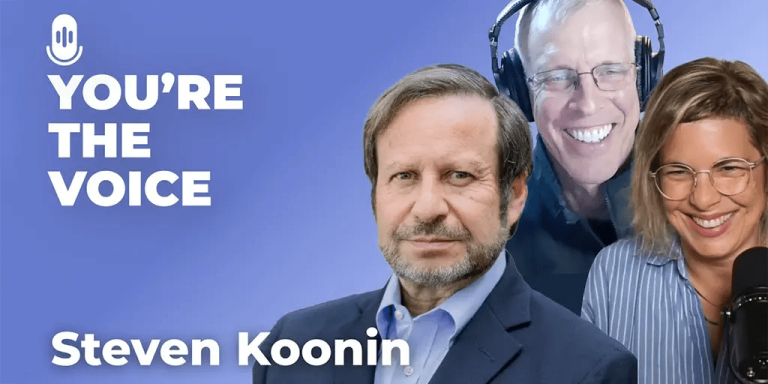From “You Are the Voice” | Author: Everat Fenigson
Co-hosted by Tom Nelson and Efrat Fenigson
🎙️ My guest today is Professor Steven Kooninco-hosted with Tom Nelson (host of the Tom Nelson Podcast). Professor Koonin is an American theoretical physicist. He was the director of the Center for Urban Science and Progress at New York University and a professor in the Department of Civil and Urban Engineering at the School of Engineering at New York University. He once served as chief scientist of the oil and natural gas department of BP, deputy secretary of science at the Department of Energy in the Obama administration, and deputy president of the California Institute of Technology, one of the most prestigious scientific research institutions in the United States.
Steven is the author of “Undecided: What Climate Science Tells Us, What It Doesn't Tell Us, and Why It Matters,” in which he argues that while experts agree on some basic facts about climate change, the implications of these facts This is not the case, and mainstream scientific research simply does not support the idea that there is a climate crisis of any kind.
This conversation discusses climate realism—the intellectual approach to alarmism about “climate change”—and the role of the media in shaping public perception. We discussed the use of the term “climate deniers,” bias in the energy industry, the challenges faced by young scientists who question the climate narrative, the role of journalists in spreading misinformation, and the influence of organizations like the United Nations. . We discuss the hit documentary “Climate Movie” and attempts at censorship. Finally, we touched on the funding dynamics of climate research and geoengineering/chemtrails. Steven emphasized the need for open scientific discussion and the importance of careful consideration of these interventions. We end with the challenge and optimism of maintaining integrity and telling the truth in a corrupt world.
“For young scientists, speaking out against the climate narrative can kill careers” – Professor Steven Koonin
This episode is released on Twitter, Spotify, Fountain and other platforms.
Is it valuable? Please like, comment, share, subscribe and support my work!

We discussed:
00:00 Coming soon
01:14 Introduction
03:54 Challenging the term “climate denier”
06:43 Climate discussion 'silent'
09:03 The impact on those who speak out
10:53 Steven’s evolution towards climate realism
16:33 Distorting the truth
21:37 Organized online promotion
27:34 Climate – Movies
32:03 Geoengineering and chemtrails
41:10 Red team, blue team
44:33 Dating carbon dioxide in deep ice
45:55 Playing bongos with Richard Feynman
49:06 A message of hope
What I gained:
- The term “climate deniers” is offensive and misleading because skeptics like Steven Koonin base their arguments on scientific evidence.
- Experience from the energy industry can provide valuable insights into how to effectively change energy systems.
- Due to funding and publishing challenges, speaking out against the climate narrative can pose career risks for young scientists.
- Kunin believes that misinformation in the media is the result of reporters not digging deeper and scientists not correcting misstatements.
- The United Nations claims to “own the science” and collaborates with Google to control search results, proving bias and censorship.
- The documentary Climate Film faced attempts at cancellation but gained widespread attention and support from viewers. It was well-received and sparked a public discussion about climate change, unlike platforms like Facebook which flagged it as misinformation.
- The funding dynamics of climate research are discussed, and it is observed that adding a climate presentation to a program can make it eligible for climate-related funding. This raises questions about the integrity of the study and its biases.
- Geoengineering, such as stratospheric aerosol injection and cloud seeding, is a topic of interest and debate. While lowering Earth's surface temperature may be technically feasible, there are concerns about unintended side effects and long-term viability of these interventions.
- Climate science requires a red team, blue team approach that encourages open and rigorous scientific discussion and challenges consensus. However, this approach is currently not favored by the Biden administration.
- Maintaining integrity and telling the truth in the face of corruption is a challenge, but scientists must present the facts and let people decide for themselves.
Watch on YouTube:
Watch/Listen on Spotify:
Follow Professors Steven Koonin and Tom Nelson:
Professor Kunin's book | Tom's Twitter | Tom's link
The above interview is archived on our ClimateTV page
Relevant
